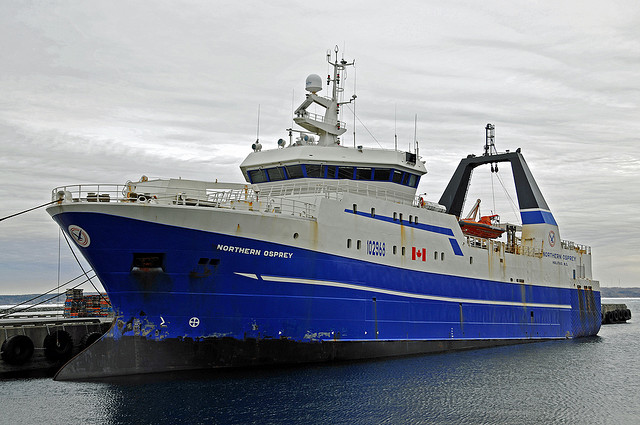Podcast: Play in new window | Download
Subscribe: RSS

A new study details how factory trawlers such as the Northern Osprey are stripping the deep oceans of fish that cannot replace themselves. (Photo by Dennis Jarvis/Flickr)
A perfunctory article deep inside yesterday’s Washington Post paints a horrifying picture of exhausted oceans — described as “more akin to a watery desert” — being scraped clean of the last traces of marine life by pitiless, gargantuan deep-water trawlers operating beyond the law and beyond sanity. The story is based on a new study of the world’s fisheries published in the journal Marine Policy (“Scientists call for end to deep-sea fishing”). (The article upholds the new Standards of Fair and Balanced Journalism set by Fox News by somehow, somewhere finding an academic mooch who sees no problem with that.)
The study paints an apocalyptic picture worthy of depiction in a Kevin Costner movie (Waterworld — the Sequel?). Having all but wiped out the near-shore fisheries that helped sustain the first 10,000 years or so of human civilization, industrial trawlers have moved into deep ocean waters where, using enormous nets and massive metal plates on steel cables deployed at depths of more than 1,700 feet (that was the mean depth in 2004), they are scarfing up the last remnants of edible deep-water fish.
The United Nations Food and Agriculture Organization estimates that there are about 45,000 industrial trawlers doing this work. That’s only one per cent of the world’s fishing fleet, employing two per cent of the world’s commercial fishermen, yet they land 50 per cent of the world’s fish. Kevin Hassett of the American Enterprise Institute told the Washington Post, “What they’re doing out there is more like mining than fishing.”
From the industrial point of view, this is a total success story. Beleaguered by pesky regulators in territorial waters that had been fished out, the big trawlers moved out to open ocean and deep water where there were no laws and there were still fish.
The problem was that no one wanted to eat the trash fish to be caught there, such as the Patagonian toothfish. The problem was sent to the marketing department. The PR guys re-branded the fish as Chilean Sea Bass, and bingo! Smooth talkers all over the hyper-civilized world were soon murmuring in their dates’ ears, “I recommend the Chilean Sea Bass, dahling,” and that problem was solved. Similarly, with a little promotion the Orange Roughy shed its trash-fish image for a featured place on trend-setting menus.
The problem that remained was of no concern to the industrialists. These deep-ocean dwellers are long-lived — the toothfish lives for 50 years, the roughy for three times that — and thus are slow to reproduce. Unlike the populations of more shallow fisheries, which can rebound if given a chance, these fish cannot survive the industrial onslaught and are simply disappearing.
This industry shares another trait with its brethren in the oil bidness, and industrial agriculture and nuclear power generation and coal extraction and the rest: it depends heavily on government subsidies, estimated at $162 million a year, or one quarter the value of the entire fleet’s annual catch. Chalk up another one for the free market system.
“It’s a waste of resources, it’s a waste of biodiversity, it’s a waste of everything,” says marine biologist Daniel Pauly of the University of British Columbia. “In the end, there is nothing left.”
The authors of the paper recommend an international treaty to impose a total ban on the practice. Really. With straight faces, that’s what they recommend.
We return you now to the crash of the industrial age, already in progress.
-0-
[Related story: Global Warming’s Evil Twin. For updates on this and other Daily Impact stories, and for short takes on other subjects, check out The Editor’s Log.]
I’d like to take this moment to plug my “If you see one, sink one” campaign about stopping criminal over fishing. If you want to save a salmon, don’t shoot a sea lion, sink a commercial fishing trawler.
No. If you want to save a salmon, stop eating salmon, and persuade others not to eat salmon either. Then the commercial fisheries will be put out of business, and not just the salmon but the seas will be saved.
No actually I eat salmon caught by the very small scale local fisheries. Seriously, enough with all the silly wishful boycott thinking.
Silly? Wishful? What could be more silly or wishful than a parasite killing its host? It is not the people who are making the best choices they can with a view to sustainable consumption who are silly, it’s the other guys.
DITTO!!!!!—GET TO THE TRUE SOURCE
Perhaps one fine day in the near future Hermann Melville’s ‘Moby Dick’ will be seen as a twisted book upholding twisted values.
It isn’t already? And I thought the overall message of the book was danger of obsession anyway.